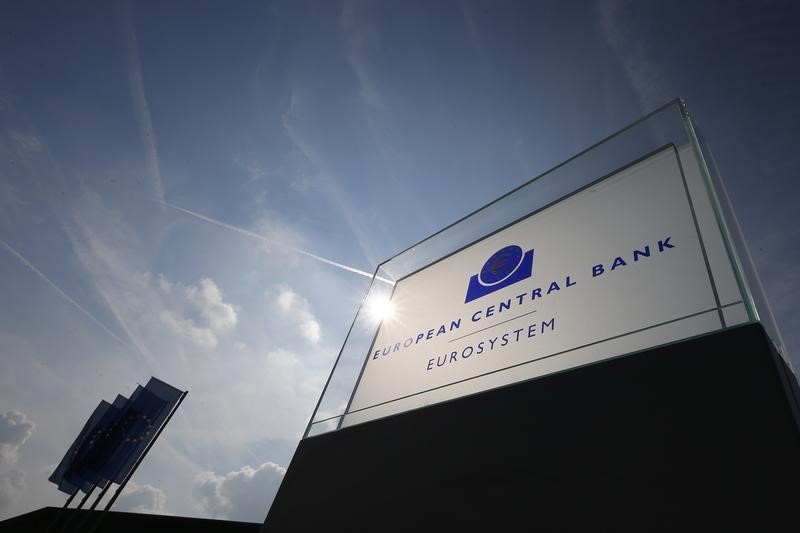* Global stocks subdued, U.S. futures point lower
* China factory-gate prices fall sharply in Aug
* Markets on edge before ECB meeting
* Germany kicks off 2020 budget debate amid stimulus hopes
By Karin Strohecker
LONDON, Sept 10 (Reuters) - Global bond yields rose on Monday, amid growing caution over the extent to which the European Central Bank will add stimulus to boost an ailing economy this week and rising hopes that Berlin could loosen its purse strings.
Germany's 30-year benchmark bond yield DE30YT=RR briefly broke into positive territory for the first time in more than a month, while U.S. Treasury yields US2YT=RR US10YT=RR US30YT=RR climbed to 18-day highs.
Safe-haven assets have been caught up in the fixed income sell-off, with gold XAU= touching a one-month trough and Japan's yen plumbing a five-week low. But equities .MIWD00000PUS failed to make gains, as weak Chinese producer prices data dampened the mood.
The bond moves comes as markets are gearing up for Thursday's European Central Bank (ECB) meeting, which is widely expected to deliver a cut to interest rates and point to further bond-buying stimulus. there is a growing chorus of opinion that ECB policymakers and other central banks with negative interest rates and sub-zero long-term sovereign bond yields are nearing the limits of stimulus policies.
Germany also starts to debate its 2020 budget in parliament later in the day, where Finance Minister Olaf Scholz's speech will be scrutinised after Reuters reported Berlin was looking into creating a "shadow budget" to boost public investment and effectively circumvent limits set by its national debt rules. stories have become more frequent in recent weeks," said Deutsche Bank's Jim Reid. "Whilst the market always gets more excited by the headlines than is justified by hard evidence of any change in policy, it's fair to conclude that market pressure and chatter on this story is building."
Europe's largest economy is teetering on the brink of recession, but strict national spending rules have tied policymakers hands on fiscal policy.
The U.S. Federal Reserve is also widely expected to cut interest rates next week as policymakers race to shield the global economy from risks, which also include Britain's planned exit from the European Union.
With interest rates plumbing record lows in many countries and the effectiveness of further bond-buying muted by already record-low borrowing costs for governments, attention has turned to increased public spending or tax cuts to fire up growth.
A CHINESE CLOUD
The sell-off in fixed income markets failed to lift global stocks, where the mood was subdued amid concerns over the health of the world economy.
Data showing China's mainland factory-gate prices shrank at their fastest pace in three years, as flagging demand at home and abroad forced some businesses to slash prices, saw Asian bourses slip lower. Europe, the pan-European stocks benchmark index STOXX 600 .STOXX fell 0.4% in a second day of losses.
China-sensitive German stocks .GDAXI eased 0.3% while France's CAC .FCHI dropped 0.6%.
"China inflation data was probably the worst combination of prints the market could have hoped for," said Stephen Innes, Market Strategist AXI Trader.
"While the enormous slide in China factory gate prices reminded us of what we already know, U.S. tariffs are sinking the Chinese economy and at a much quicker pace than anyone could have imagined."
However, climbing bond yields helped lift European banking stocks .SX7P 0.3% - one of the few sectors in the black.
U.S. stock futures ESc1 YMc1 NQc1 pointed to a lower open on Wall Street after the S&P 500 .SPX ended flat in New York on Monday. .N
In currencies, the rise in Treasury yields helped lift the dollar to touch a five-week high of 107.50 yen JPY=EBS . The euro EUR=EBS was flat at $1.104 after reaching an overnight high of $1.1067.
The pound GBP=D3 traded near a six-week high of $1.2385 after a law came into force demanding that Prime Minister Boris Johnson delay Britain's departure from the European Union unless he can strike a divorce deal with the bloc. futures hit their highest level in six weeks in Asia after Saudi Arabia's new energy minister confirmed he would stick with his country's policy of limiting crude output to support prices. O/R
U.S. crude CLc1 traded at $57.97 a barrel after hitting the highest since July 31. Brent crude futures LCOc1 climbed to $62.67 a barrel.
Prince Abdulaziz bin Salman, who became Saudi Arabia's new energy minister on Sunday, told reporters there would be "no radical" change in Saudi's oil policy. Saudi Arabia is OPEC's de facto leader. German 30-yr yield
https://tmsnrt.rs/2A8XP5y
^^^^^^^^^^^^^^^^^^^^^^^^^^^^^^^^^^^^^^^^^^^^^^^^^^^^^^^^^^^>
